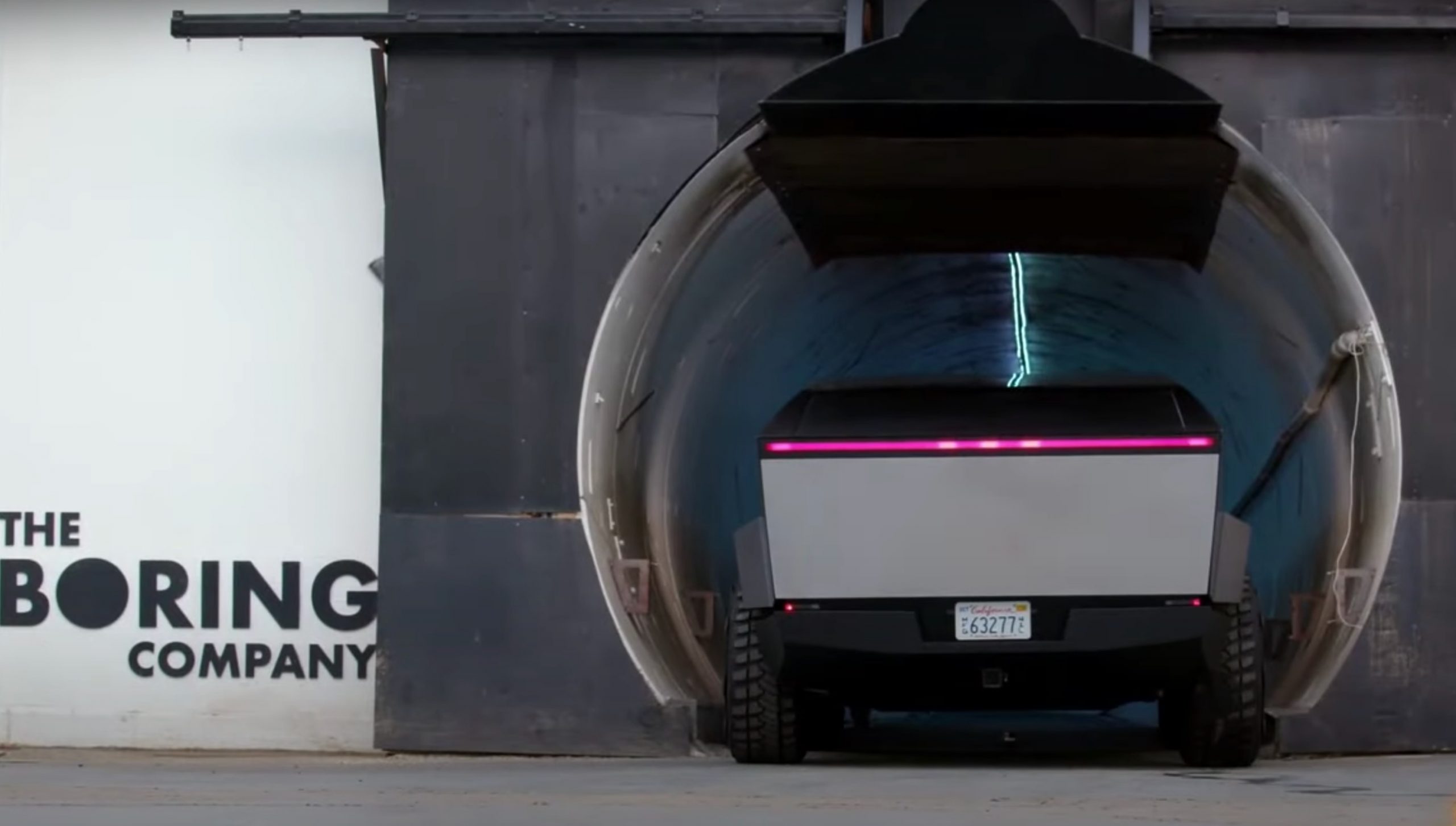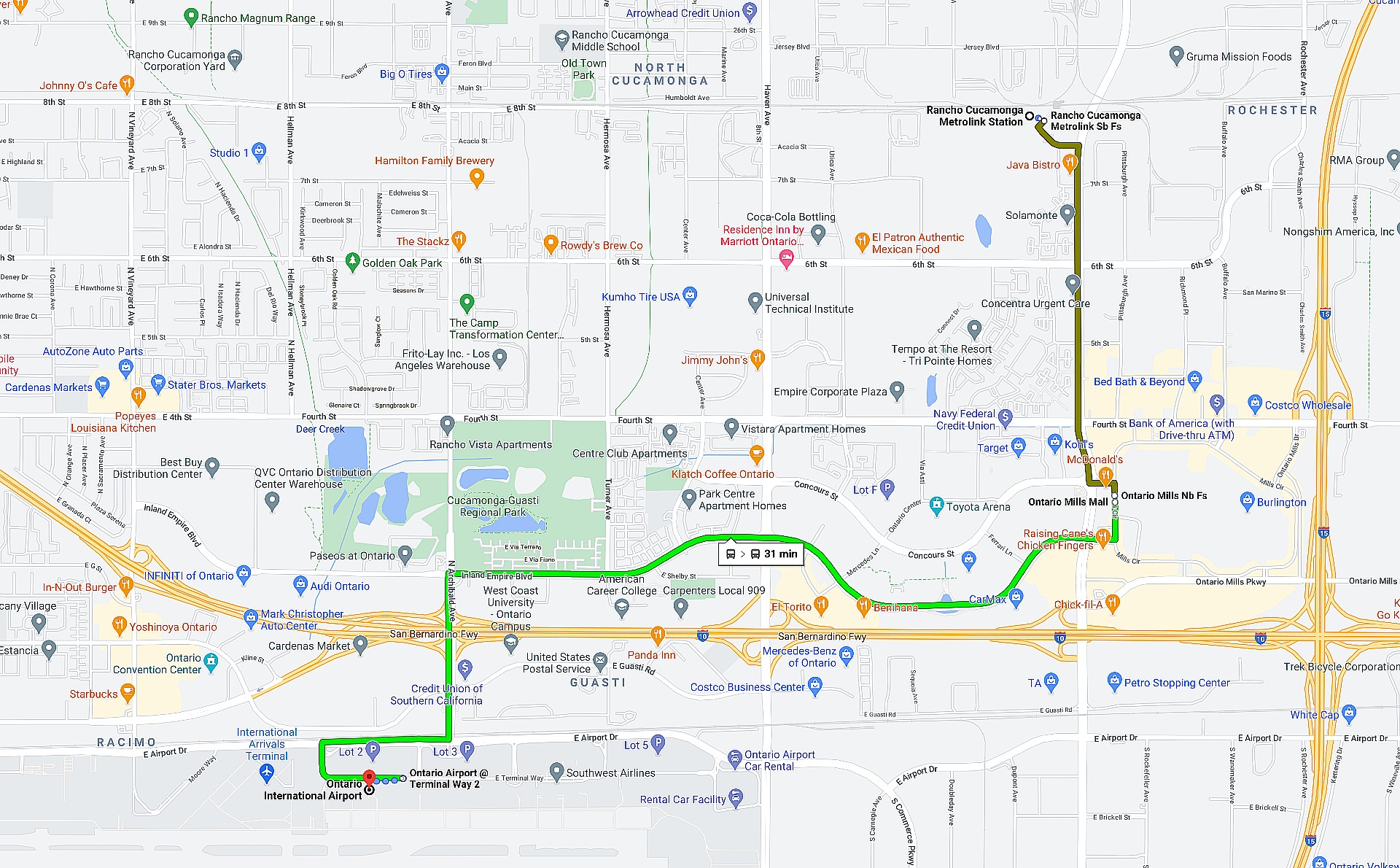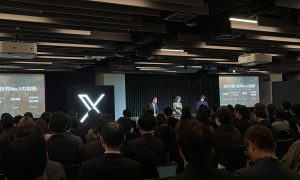

News
The Boring Co.’s projects are making transit departments rethink above-ground travel
The Boring Company’s underground tunneling projects are widely-appealing to Transit Departments and Authorities across the United States. Because of the sustainable tone of Elon Musk’s Boring Company, along with the efficiency of an Express-based system, agencies responsible for solving the issue of public passenger transportation are considering underground options more often than ever before. Above-ground public travel options, like Monorails or buses, are being ditched for underground options, and subways are outdated and not widely considered by these agencies.
Elon Musk’s underground tunneling venture has made it from California to Las Vegas, and now, back to California again, as the San Bernardino County Transportation Authority (SBCTA) is considering a new underground tunneling project from the Boring Company. Later today, on February 3rd, the entity will consider the Boring Company’s submission for an underground tunnel that would take travelers from several different locations to the Ontario International Airport, located in Southern California. While the Boring Company has already received the equivalent of preliminary approval from the Transportation Authority, more questions are being asked to secure the tunnel’s place in the densely-populated and traffic-heavy area of Southern California.
In September 2020, the SBCTA Board of Directors approved the release of a Request for Qualifications, seeking qualified entities to submit a Statement of Qualifications for a potential tunneling project in San Bernardino County. According to documents released by the SBCTA, the tunnel will run from the Rancho Cucamonga Metrolink Station to the Ontario International Airport, procuring a design-build and transitional operate-maintain methodology that will have the two transit systems running concurrently to complement one another.
The 31-minute ride from the Rancho Cucamonga Metrolink Station to the Ontario International Airport could be expedited thanks to a new Boring Company tunnel proposal. (Google Maps)
The only thing is, not many companies with expertise in tunneling stepped forward. And by not many, only one did: The Boring Company.
The SBCTA wrote:
“In response to the RFQ, one Statement of Qualifications (SOQ), from The Boring Company, was received on November 30, 2020. A review panel was assembled involving a technical review team and an executive oversight team consisting of representatives from the City of Rancho Cucamonga, the City of Ontario, the OIAA, Omnitrans, and SBCTA. The SOQ was deemed responsive and passed all the minimum requirements of the RFQ.”
After an initial assessment from SBCTA Board Members, the Boring Company met the minimum requirements to qualify for further scrutiny. The Boring Company’s Statement of Qualifications only received a score of 58/100. Still, more information regarding financing, timing, ridership, and how the system will operate in conjunction with the Rancho Cucamonga Metrolink Station will likely increase that score. These issues are set to be brought up during the Board of Directors meeting later today.
Ditching Above-Ground Systems for Underground Tunnels
Above-ground systems of transportation have been around for ages. Monorails, trains, and other large-scale passenger transportation systems have been aligned with cost-effective and efficient travel for decades, but a new era has come in thanks to Elon Musk. While many argue that the Boring Company’s system is a simple revision of a subway, it is far from identical. The Boring Company loops use Tesla’s all-electric vehicles for passenger transport, eliminating jam-packed, unsanitary, and oftentimes, uncomfortable situations where underground travel is offered.
Sitting in an automotive seat, likely joined by colleagues, or in some cases, complete strangers, is much more comfortable in a smaller setting, especially as the COVID-19 pandemic rolls on. Additionally, the express-system eliminates the need for unneeded stops, decreasing total travel time.
While the San Bernardino project seems to indicate that the Boring Company will work with an already-operational monorail system, other projects have completely abandoned the idea of using an above-ground Monorail system. One of the most notable is the Boring Company’s Vegas Loop. After the Las Vegas Convention and Visitors Authority (LVCVA) purchased the bankrupt Vegas Monorail system in 2020, it opened the door for the Boring Company to expand its possible tunneling to property exclusive to the Monorail.
The Boring Company has several other large-scale projects in the proposal stage, including one in Fort Lauderdale, Florida, and Chicago, Illinois. These projects are in the early stages and will be subjected to the speed at which local authorities move. Some agencies are quicker to get the ball rolling on public transit projects than others. For example, a tunnel between Baltimore and Washington D.C. would eliminate the need to travel on the Maryland Transit Authority’s Lightrail system, a cost-effective, but not time-effective, way to travel from suburbs of Baltimore County to the Nation’s Capitol. This project has been in a stalemate for several years but would expedite the travel time from Baltimore’s Camden Yards, home of the Orioles, to Washington. The Boring Company’s website indicates that an environmental review is pending.
Underground tunnels may be the way of the future, much like electric cars. At the forefront, a South African-born entrepreneur named Elon Musk is leading the charge, changing how human beings will travel from one point to another.
The San Bernardino County Transportation Authority’s Agenda is available below, with The Boring Company’s consideration beginning on page 13.
Tbc San Bernardino Tunnel by Joey Klender on Scribd
News
Tesla begins Robotaxi certification push in Arizona: report
Tesla seems serious about expanding its Robotaxi service to several states in the coming months.

Tesla has initiated discussions with Arizona transportation regulators to certify its driverless Robotaxi service in the state, as per a recent report from Bloomberg News. The move follows Tesla’s launch of its Robotaxi pilot program in Austin, Texas, as well as CEO Elon Musk’s recent comments about the service’s expansion in the Bay Area.
The Arizona Department of Transportation confirmed to Bloomberg that Tesla has reached out to begin the certification process for autonomous ride-sharing operations in the state. While details remain limited, the outreach suggests that Tesla is serious about expanding its driverless Robotaxi service to several territories in the coming months.
The Arizona development comes as Tesla prepares to expand its service area in Austin this weekend, as per CEO Elon Musk in a post on X. Musk also stated that Tesla is targeting the San Francisco Bay Area as its next major market, with a potential launch “in a month or two,” pending regulatory approvals.
Tesla first launched its autonomous ride-hailing program on June 22 in Austin with a small fleet of Model Y vehicles, accompanied by a Tesla employee in the passenger seat to monitor safety. While still classified as a test, Musk has said the program will expand to about 1,000 vehicles in the coming months. Tesla will later upgrade its Robotaxi fleet with the Cyercab, a two-seater that is designed without a steering wheel.
Sightings of Cybercab castings around the Giga Texas complex suggests that Tesla may be ramping the initial trial production of the self-driving two-seater. Tesla, for its part, has noted in the past that volume production of the Cybercab is expected to start sometime next year.
In California, Tesla has already applied for a transportation charter-party carrier permit from the state’s Public Utilities Commission. The company is reportedly taking a phased approach to operating in California, with the Robotaxi service starting with pre-arranged rides for employees in vehicles with safety drivers.
News
Tesla sets November 6 date for 2025 Annual Shareholder Meeting
The automaker announced the date on Thursday in a Form 8-K.

Tesla has scheduled its 2025 annual shareholder meeting for November 6, addressing investor concerns that the company was nearing a legal deadline to hold the event.
The automaker announced the date on Thursday in a Form 8-K submitted to the United States Securities and Exchange Commission (SEC). The company also listed a new proposal submission deadline of July 31 for items to be included in the proxy statement.
Tesla’s announcement followed calls from a group of 27 shareholders, including the leaders of large public pension funds, which urged Tesla’s board to formally set the meeting date, as noted in a report from The Wall Street Journal.
The group noted that under Texas law, where Tesla is now incorporated, companies must hold annual meetings within 13 months of the last one if requested by shareholders. Tesla’s previous annual shareholder meeting was held on June 13, 2024, which placed the July 13 deadline in focus.
Tesla originally stated in its 2024 annual report that it would file its proxy statement by the end of April. However, an amended filing on April 30 indicated that the Board of Directors had not yet finalized a meeting date, at least at the time.
The April filing also confirmed that Tesla’s board had formed a special committee to evaluate certain matters related to CEO Elon Musk’s compensation plan. Musk’s CEO performance award remains at the center of a lengthy legal dispute in Delaware, Tesla’s former state of incorporation.
Due to the aftermath of Musk’s legal dispute about his compensation plan in Delaware, he has not been paid for his work at Tesla for several years. Musk, for his part, has noted that he is more concerned about his voting stake in Tesla than his actual salary.
At last year’s annual meeting, TSLA shareholders voted to reapprove Elon Musk’s compensation plan and ratified Tesla’s decision to relocate its legal domicile from Delaware to Texas.
Elon Musk
Grok coming to Tesla vehicles next week “at the latest:” Elon Musk
Grok’s rollout to Tesla vehicles is expected to begin next week at the latest.

Elon Musk announced on Thursday that Grok, the large language model developed by his startup xAI, will soon be available in Tesla vehicles. Grok’s rollout to Tesla vehicles is expected to begin next week at the latest, further deepening the ties between the two Elon Musk-led companies.
Tesla–xAI synergy
Musk confirmed the news on X shortly after livestreaming the release of Grok 4, xAI’s latest large language model. “Grok is coming to Tesla vehicles very soon. Next week at the latest,” Musk wrote in a post on social media platform X.
During the livestream, Musk and several members of the xAI team highlighted several upgrades to Grok 4’s voice capabilities and performance metrics, positioning the LLM as competitive with top-tier models from OpenAI and Google.
The in-vehicle integration of Grok marks a new chapter in Tesla’s AI development. While Tesla has long relied on in-house systems for autonomous driving and energy optimization, Grok’s integration would introduce conversational AI directly into its vehicles’ user experience. This integration could potentially improve customer interaction inside Tesla vehicles.
xAI and Tesla’s collaborative footprint
Grok’s upcoming rollout to Tesla vehicles adds to a growing business relationship between Tesla and xAI. Earlier this year, Tesla disclosed that it generated $198.3 million in revenue from commercial, consulting, and support agreements with xAI, as noted in a report from Bloomberg News. A large portion of that amount, however, came from the sale of Megapack energy storage systems to the artificial intelligence startup.
In July 2023, Musk polled X users about whether Tesla should invest $5 billion in xAI. While no formal investment has been made so far, 68% of poll participants voted yes, and Musk has since stated that the idea would be discussed with Tesla’s board.
-

 Elon Musk1 week ago
Elon Musk1 week agoTesla investors will be shocked by Jim Cramer’s latest assessment
-

 Elon Musk21 hours ago
Elon Musk21 hours agoxAI launches Grok 4 with new $300/month SuperGrok Heavy subscription
-

 Elon Musk3 days ago
Elon Musk3 days agoElon Musk confirms Grok 4 launch on July 9 with livestream event
-

 News7 days ago
News7 days agoTesla Model 3 ranks as the safest new car in Europe for 2025, per Euro NCAP tests
-

 Elon Musk2 weeks ago
Elon Musk2 weeks agoA Tesla just delivered itself to a customer autonomously, Elon Musk confirms
-

 Elon Musk1 week ago
Elon Musk1 week agoxAI’s Memphis data center receives air permit despite community criticism
-

 Elon Musk2 weeks ago
Elon Musk2 weeks agoTesla’s Omead Afshar, known as Elon Musk’s right-hand man, leaves company: reports
-

 News2 weeks ago
News2 weeks agoXiaomi CEO congratulates Tesla on first FSD delivery: “We have to continue learning!”













